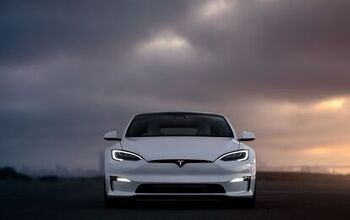Feds Could Pull Tesla Roadster's Advanced Airbag Waiver
Automotive News [sub] points us to a notice in the Federal Register, which notes that
In accordance with the procedures in 49 CFR Part 555, Tesla Motors, Inc., has petitioned the agency for renewal of a temporary exemption from certain advanced air bag requirements of FMVSS No. 208. The basis for the application is that the petitioner avers that compliance would cause it substantial economic hardship and that it has tried in good faith to comply with the standard…
Not so bad, right? As a small manufacturer, Tesla simply has to prove that it still isn’t in the financial shape to put advanced airbags in its money-losing Roadster… after all, nothing has fundamentally changed since the initial waiver was granted. But it turns out that NHTSA isn’t going to give out these waivers like candy anymore…
Notwithstanding those previous grants of exemption, NHTSA is considering two key issues–
(1) whether it is in the public interest to continue to grant such
(2) to the extent such petitions are granted, what plans and
While the exemption authority was created to address the problems of small manufacturers and the agency wishes to be appropriately attentive to those problems, it was not anticipated by the agency that use of this authority would result in small manufacturers being given much more than relatively short term exemptions from recently implemented safety standards, especially those addressing particularly significant safety problems.
Given the passage of time since the advanced air bag requirements were established and implemented, and in light of the benefits of advanced air bags, NHTSA is considering whether it is in the public interest to continue to grant exemptions from these requirements, particularly under the same terms as in the past. The costs of compliance with the advanced air bag requirements of FMVSS No. 208 are costs that all entrants to the U.S. automobile marketplace should expect to bear. Furthermore, NHTSA understands that, in contrast to the initial years after the advanced air bag requirements went into effect, low volume manufacturers now have access to advanced air bag technology. Accordingly, NHTSA tentatively concludes that the expense of advanced air bag technology is not now sufficient, in and of itself, to justify the grant of a petition for a hardship exemption from the advanced air bag requirements
And guess what? NHTSA should be pulling Tesla’s waiver. After all, if a couple of guys importing Shuanghuan Noble gliders in small batches and converting them to CNG power are complying with NHTSA’s Advanced Airbag requirement, why shouldn’t a well-funded, public company that has received hundreds of millions of dollars in taxpayer support?
More by Edward Niedermeyer
Latest Car Reviews
Read moreLatest Product Reviews
Read moreRecent Comments
- Teddyc73 Oh look dull grey with black wheels. How original.
- Teddyc73 "Matte paint looks good on this car." No it doesn't. It doesn't look good on any car. From the Nissan Versa I rented all the up to this monstrosity. This paint trend needs to die before out roads are awash with grey vehicles with black wheels. Why are people such lemmings lacking in individuality? Come on people, embrace color.
- Flashindapan Will I miss the Malibu, no. Will I miss one less midsize sedan that’s comfortable, reliable and reasonably priced, yes.
- Theflyersfan I used to love the 7-series. One of those aspirational luxury cars. And then I parked right next to one of the new ones just over the weekend. And that love went away. Honestly, if this is what the Chinese market thinks is luxury, let them have it. Because, and I'll be reserved here, this is one butt-ugly, mutha f'n, unholy trainwreck of a design. There has to be an excellent car under all of the grotesque and overdone bodywork. What were they thinking? Luxury is a feeling. It's the soft leather seats. It's the solid door thunk. It's groundbreaking engineering (that hopefully holds up.) It's a presence that oozes "I have arrived," not screaming "LOOK AT ME EVERYONE!!!" The latter is the yahoo who just won $1,000,000 off of a scratch-off and blows it on extra chrome and a dozen light bars on a new F150. It isn't six feet of screens, a dozen suspension settings that don't feel right, and no steering feel. It also isn't a design that is going to be so dated looking in five years that no one is going to want to touch it. Didn't BMW learn anything from the Bangle-butt backlash of 2002?
- Theflyersfan Honda, Toyota, Nissan, Hyundai, and Kia still don't seem to have a problem moving sedans off of the lot. I also see more than a few new 3-series, C-classes and A4s as well showing the Germans can sell the expensive ones. Sales might be down compared to 10-15 years ago, but hundreds of thousands of sales in the US alone isn't anything to sneeze at. What we've had is the thinning of the herd. The crap sedans have exited stage left. And GM has let the Malibu sit and rot on the vine for so long that this was bound to happen. And it bears repeating - auto trends go in cycles. Many times the cars purchased by the next generation aren't the ones their parents and grandparents bought. Who's to say that in 10 years, CUVs are going to be seen at that generation's minivans and no one wants to touch them? The Japanese and Koreans will welcome those buyers back to their full lineups while GM, Ford, and whatever remains of what was Chrysler/Dodge will be back in front of Congress pleading poverty.

































Comments
Join the conversation
Why not hire Tiger Woods? He's the best person to sell golf carts.
I can't believe that the political impetus to fast-track goofy golf carts is already crumbling. I thought for sure that the global warming hysteria would be forever, just like dot-com stocks and disco music.